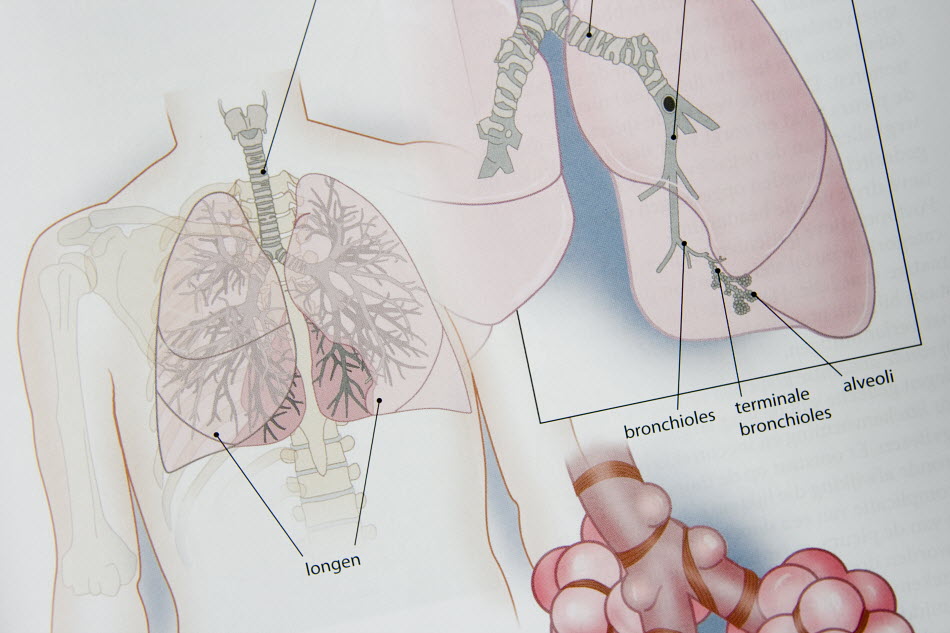Ook ontstekingseiwit gevonden in longen ex-rokers
Het eiwit fstl1, een bekend ontstekingseiwit bij reuma, is ook bij COPD-patiënten verhoogd in de longen aanwezig. De productie van dit eiwit in de longen wordt aangezet door roken en speelt een rol bij ontsteking en slecht weefselherstel bij COPD. Dat concludeert Navessa Padma Tania in haar proefschrift over de rol van fstl1 bij COPD. Zij laat zien dat niet alleen patiënten met COPD, maar ook gezonde rokers en ex-rokers hoge concentraties van dit eiwit in hun longweefsel hebben. Tania promoveert 6 oktober 2017 aan de Rijksuniversiteit Groningen. Haar onderzoek werd gefinancierd door het Longfonds.
‘Dit onderzoek geeft meer inzicht in het mechanisme dat zorgt voor longproblemen bij COPD,’ verklaart Reinoud Gosens, promotor van Navessa Tania en adjunct-hoogleraar bij de RUG. ‘We kunnen met deze kennis niet direct een geneesmiddel maken maar het ontstekingseiwit fstl1 is mogelijk wel één van de aangrijpingspunten voor een toekomstig medicijn.’
Slecht herstel longweefsel
Het onderzoek past goed binnen Gosens onderzoekslijn naar de verbetering van longweefselherstel. ‘Een groot probleem bij COPD is dat het longweefsel zo slecht herstelt,’ legt Gosens uit. ‘Fstl1 lijkt daarin een rol te spelen, omdat het de groeifactor BMP remt. BMP is juist belangrijk voor weefselherstel. Fstl1 remt daardoor dus het herstel.’
Boosdoener
Een ander probleem bij COPD is de altijd aanwezige ontstekingen in de longen. Ook daarin is fstl1 een boosdoener. Het bevordert namelijk een ontstekingsreactie. ‘Dat effect van fstl1 kenden we al van onderzoek naar reuma, maar blijkt in de longen inderdaad ook aanwezig te zijn.’ Tot slot speelt fstl1 een rol bij de ontwikkeling van bloedvaten in de longen. ‘Verhoogde aanwezigheid van fstl1 in de longen kan een effectieve ontwikkeling van bloedvaten in de longen verstoren. Ook dit draagt mogelijk bij aan de klachten van COPD.
Roken onomkeerbaar effect
Omdat fstl1 ook aanwezig is in longen van gezonde mensen, kun je niet zeggen dat het de oorzaak is van COPD. ‘Wel zien we duidelijk een verschil tussen longen van mensen die roken of gerookt hebben en longen van niet-rokers. Niet-rokers hebben dit eiwit in veel mindere mate. Het zou daarom wel kunnen dat aanwezigheid van het eiwit een persoon vatbaarder maakt voor COPD, waarschijnlijk in combinatie met andere factoren,’ denkt Gosens. Het onderzoek bevestigt wel wat we al wisten: roken veroorzaakt onomkeerbare veranderingen in de longen. Die effecten blijven, ook als je stopt met roken. ‘Dat wil niet zeggen dat stoppen met roken geen zin heeft; het is altijd veel beter dan doorgaan met roken.’
CV
Reinoud Gosens (1977) is adjunct professor in Translational Pharmacology bij de afdeling Moleculaire Farmacologie van de Faculteit Science en Engineering van de RUG. Hij promoveerde aan de RUG in 2004 en was vervolgens postdoc aan de universiteit van Manitoba in Canada tot 2007. Gosens onderzoek richt zich op mechanismen van longweefselherstel bij longaandoeningen.
Noot voor de redactie
- Het proefschrift van Navessa Tania is getiteld Developmental and pathological roles of BMP/follistatin-like 1 in the lung. Tania is inmiddels verbonden aan de University of Washington, in de VS. Haar onderzoek werd gefinancierd door het Longfonds.
- Meer informatie: prof.dr. Reinoud Gosens

Meer nieuws
-
26 februari 2026
Vici-beurs voor hoogleraar Neurobiologie Marieke Wermer
-
17 februari 2026
De lange zoektocht naar nieuwe fysica
